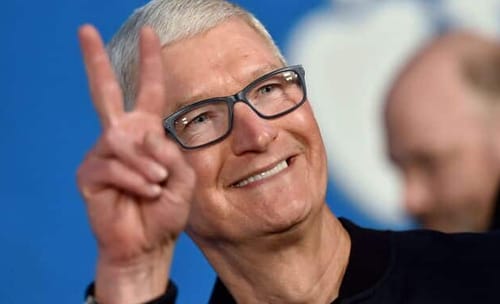 |
| Apple CEO Owns Cryptocurrency |
Apple CEO Tim Cook confirmed during a discussion at the Dealbook conference that he has invested his personal money in cryptocurrencies.
“I think it makes sense to use it as part of a diversified investment portfolio,” the CEO said in an interview with Andrew Rusukin. By the way, I will not give any investment advice to anyone, please do it quickly without specifying the specific cryptocurrency in which to invest.
The CEO added, "I've been interested in this for a while. I've been researching and so on. I find it interesting.
However, Cook confirmed his investment in cryptocurrency. But he's more cautious about Apple's plans as a company. Rule out the possibility of investing the company's cash balance in cryptocurrencies.
He said Apple has no plans to allow people to purchase its products in the near future. However, the CEO has played with the idea that the company will look at other things in terms of cryptocurrency, but has not announced any specific plans.
When asked about NFT, Cook found it very interesting. However, normal adjustment may take some time.
During the half-hour conversation, Tim Cook was asked about other major topics that have moved Apple over the past few months. Including his lawsuit with Epic Games.
When asked if users should install apps from sources other than the company's App Store through processes like sideloading, the CEO noted that Apple believes its method is the best for security.
The CEO said, if you want to sideload, you can buy an Android phone. This option is displayed when you visit the launcher store. If this is important to you, consider buying an Android phone.
As part of a diversified investment portfolio
Cook continues that measure, allowing users to download their iPhone apps, much like automakers sell cars without airbags and seat belts.
He said it was too risky. If it doesn't provide the ultimate in security and privacy, neither will your iPhone.
Cook's comments came less than a week after corporate vice president Craig Federighi made similar comments at this year's Web Summit.
The company also released several reports earlier this year, all of which assume that users who install software that hasn't been verified by the App Store's verification program can expose their phones to malware and other security threats.
According to the company, the sideloading policy results in a lower number of iOS malware compared to other platforms like Android.
While sideloading is strictly opposed on mobile platforms, it is not on Mac computers because it gives users more flexibility when installing software.
Critics say Apple could take a similar approach with the iPhone and use a gatekeeper-like system in macOS to check if an app contains known malware or if the developer's signing certificate has been revoked.
However, the company said that this method is not suitable because iPhone is used to store more personal information, and this method has resulted in unacceptable levels of malware on your Mac.
